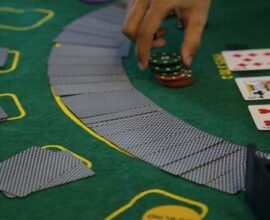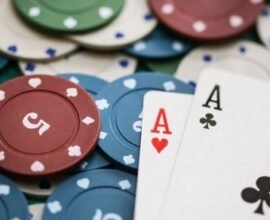David Chow would never be mistaken for Walt Disney. Start with the torpedo-length cigar and the designer suit, two sizes too big for his rail-thin frame. Add his flamboyant career in gambling, which Mr. Chow says has made him an easy mark for law enforcement.
“They looked into my background for years — the F.B.I., C.I.A., you name it,” said Mr. Chow, who used to work in Las Vegas and now organizes gambling junkets to Macao’s casinos. “They never found anything.”
Yet Mr. Chow is one of several people here who are determined to polish the image of this down-at-the- heels gambling haven. He is building a theme park on Macao’s waterfront, with a mock Chinese fishing village, a Roman Colosseum and a man- made volcano that spews artificial lava. “We have to figure out how to make Macao an international resort,” Mr. Chow said. “We need some family attractions.”
If Mr. Chow has his way, Macao will someday be a tourist destination for families from China and the rest of Asia. To turn Macao into Las Vegas on the South China Sea, however, will require a face-lift even more dramatic than taking the strippers off the Strip.
Notorious as a disreputable hideaway for hard-eyed gamblers from Hong Kong, Taiwan and mainland China, Macao is almost a byword for bad behavior. People come here to get away from their families.
“I would never bring my children here,” said Ho Man-tong, a footloose Chinese businessman, as he emerged bleary-eyed from the blackjack tables in the Hotel Lisboa. Like other casinos here, the Lisboa teems with prostitutes from Russia and rural areas of China.
Portugal handed over this vest- pocket colony to China two years ago this month. Local people say the real handover will occur in January, when Macao’s government throws open the $2 billion gambling industry to competition, ending a six-decade monopoly.
Macao plans to issue three new casino licenses. The prospect of serving China’s vast gambling-crazed market has attracted bids from 21 companies, including marquee names from the Las Vegas Strip.
MGM Mirage, Park Place Entertainment, which owns Caesar’s Palace, and Steve Wynn, the builder of the Bellagio, are among those who have applied. Aspinalls Club, a town- house casino in London, has also bid, as has Stanley Ho, the Hong Kong billionaire, who has held the sole license since 1962.
Handicappers, of which there are plenty in Macao, predict that Mr. Ho will win one of the licenses. Though he is losing his monopoly, the 79- year-old tycoon still wields considerable influence. The taxes paid by his 11 casinos account for 60 percent of Macao’s total receipts.
At least one license is expected to be awarded to a Las Vegas company. Macao views the American operators as the surest way to lift the stature of its gambling industry.
“We are never going to be Las Vegas, but we can be the sort of place where a family can come to spend a nice holiday,” said Ng Kuok Cheong, the sole pro-democracy member of Online Casino Singapore.
As João Severino, the somewhat theatrical publisher of a local Portuguese newspaper, put it: “Macao needs a new image. We can’t have gangsters at the gaming tables with their guns pressed against people’s backs.”
In the last decade, people say, Macao’s casinos have become almost sinister in their seediness. The Lisboa is a monument to quiet desperation. A pall of cigarette smoke hangs over its cavernous main hall as hundreds of gamblers gather grimly around the tables. The carpet is stained and frayed.
The V.I.P. rooms that line the main hall are brighter and cleaner. But officials say many are controlled by Chinese gangs, known as triads. On most days, the rooms are packed with high-rollers, some of them Communist Party cadres from the mainland, who are most likely gambling with ill-gotten gains.
In the months leading to the 1999 handover, the triads waged war for control of the V.I.P. rooms. Macao’s government scared the gangs back into the shadows. But they have not relinquished their grip on this part of the casino business.
Mr. Ho declined a request for an interview, as did the Macao authorities. They said they were busy reviewing the bids.
The government is taking its time, in part to weed out crime syndicates that may try to obtain a license. Still, some outsiders contend Macao is simply too murky for American companies, which have shareholders and state gambling licenses to protect.
“It is permeated by triads; there’s no two ways about it,” said Dan Grove, a retired F.B.I. agent who advises casino companies for Hill & Associates, a private investigation concern. American companies, he said, would not want to lose their licenses in Nevada or New Jersey over some lowlife people in Macao.
David Chow is also among the skeptics. He would love the Las Vegas operators to build glittering resorts in Macao. His own prize asset is the Legend Club, a private casino and apartment tower that caters to high-rollers (Stanley Ho runs the casino). The club’s members drain bottles of Château Pétrus while they gamble amid faux-baroque splendor.
But Mr. Chow, 52, fears that American companies will not be able to come to terms with the raffish business culture of Macao. While he denies the enclave is overrun by criminal elements, he concedes that some local aspects of the industry would raise eyebrows in the United States.
“American people are very cautious,” Mr. Chow said. “They always say that Macao is a center for money laundering. We’re a small town with small-town politics. I just can’t put the two together.”





